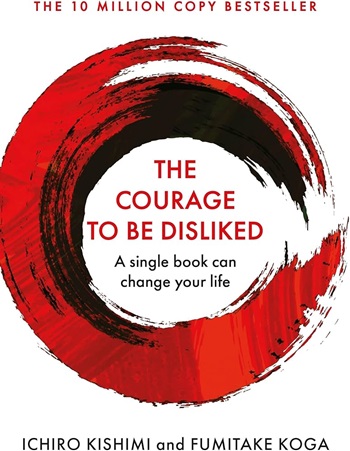Jan 01, 2026
Jan 01, 2026
Embracing Authenticity in a World of Approval
 In a world where social validation often dictates our actions, the concept of embracing the courage to be disliked can seem revolutionary. This idea, profoundly explored in the Japanese bestseller “The Courage to Be Disliked” by Ichiro Kishimi and Fumitake Koga, is rooted in the psychological theories of Alfred Adler. The book, structured as a dialogue between a philosopher and a young man, delves into the essence of living a fulfilling life by prioritizing personal freedom over societal approval.
In a world where social validation often dictates our actions, the concept of embracing the courage to be disliked can seem revolutionary. This idea, profoundly explored in the Japanese bestseller “The Courage to Be Disliked” by Ichiro Kishimi and Fumitake Koga, is rooted in the psychological theories of Alfred Adler. The book, structured as a dialogue between a philosopher and a young man, delves into the essence of living a fulfilling life by prioritizing personal freedom over societal approval.
Understanding Adlerian Psychology
Alfred Adler, an Austrian psychotherapist, introduced the concept of individual psychology, which emphasizes the importance of social interest and community feeling. According to Adler, the primary goal of human behavior is to strive for significance and belonging. However, this pursuit often leads to a paradox where individuals compromise their true selves to gain acceptance from others. Kishimi and Koga argue that true happiness stems from the courage to be disliked, as it allows individuals to live authentically and in accordance with their own values.
The Fear of Disapproval
One of the central themes of the book is the pervasive fear of disapproval. Many people go to great lengths to be liked, often at the expense of their own happiness and authenticity. This fear is deeply ingrained in our psyche, as social beings naturally seek validation and acceptance. However, Kishimi and Koga suggest that this need for approval can become a hindrance, trapping individuals in a cycle of people-pleasing and self-neglect.
Embracing Dislike as Freedom
The authors propose that being disliked is not only inevitable but also a sign of true freedom. When individuals make choices based on their own principles and desires, they are bound to encounter opposition. This opposition, however, is a testament to their authenticity. As the philosopher in the book states, “Freedom is being disliked by other people.” This perspective shifts the focus from external validation to internal fulfillment, encouraging individuals to prioritize their own happiness over societal expectations.
Practical Examples
Consider the example of a young professional who chooses to pursue a career in the arts despite societal pressure to follow a more conventional path. Initially, this decision may attract criticism and disapproval from family and friends. However, by staying true to their passion, the individual experiences a profound sense of fulfillment and purpose. Over time, this authenticity not only brings personal happiness but also inspires others to embrace their own unique paths.
Another example can be seen in the realm of personal relationships. Imagine someone who decides to end a toxic friendship despite the fear of being judged by mutual acquaintances. This act of courage, though difficult, ultimately leads to healthier and more meaningful connections. By prioritizing their well-being, the individual sets a powerful example of self-respect and integrity.
Quotes to Reflect On
The book is rich with insightful quotes that encapsulate its core messages. Here are a few to ponder:
These quotes highlight the importance of self-empowerment and the intrinsic value of living a life true to oneself.
Conclusion
“The Courage to Be Disliked” offers a transformative perspective on happiness and authenticity. By embracing the inevitability of being disliked, individuals can break free from the constraints of societal approval and live more fulfilling lives. This courage, rooted in Adlerian psychology, empowers people to prioritize their own values and desires, ultimately leading to a deeper sense of purpose and joy.
In a world that often equates popularity with success, Kishimi and Koga’s work serves as a reminder that true happiness lies in the courage to be oneself, even in the face of disapproval. As we navigate our own journeys, let us remember that the path to fulfillment is paved with authenticity and the courage to be disliked.
“Freedom is being disliked by other people. It is proof that you are living in accordance with your own principles.”
This quote encapsulates the central theme of the book, which encourages readers to embrace the courage to live without being bound by the need for approval from others. It calls for a life of self-determination, unshackled from societal expectations.
The key to inner peace is embracing oneself without seeking validation from others which will lead to a life of freedom, fulfillment, and unshakeable self-confidence.
28-Sep-2024
More by : Shalini Vohra